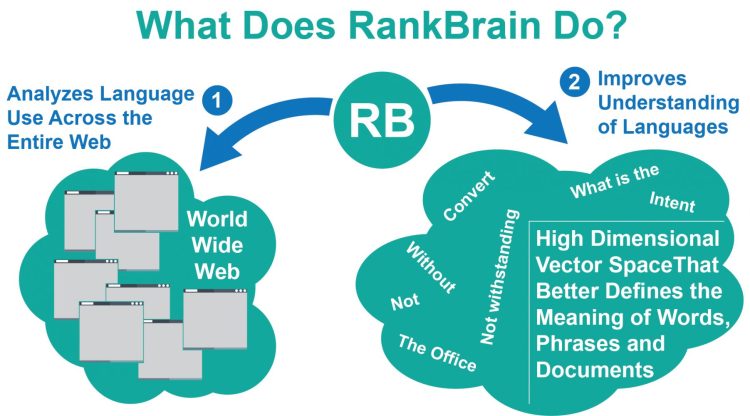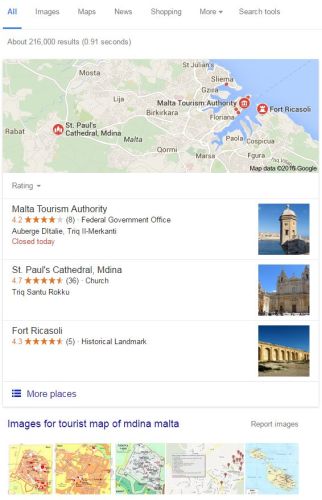Stop the Madness, RankBrain Isn’t Taking Over the Whole Google Algo
UPDATE 31 October 2017: Added video of Google’s Gary Illyes discussing RankBrain with Eric Enge at Pubcon 2016
In today’s post, I plan to do some serious myth-busting on the topic of RankBrain. I also plan to share some perspective on how it impacts you as a digital marketer. This has been driven by discussions I have had with numerous Googlers along the way, and other smart people.
For clarity, I will quote Googlers where I can, and you should treat the rest of this post as my “educated interpretation” of the statements I publish.
If you’re interested in a background in machine learning overall, you can get that by reading this post of mine on the Moz Blog: The Machine Learning Revolution: How it Works and its Impact on SEO.
What Is RankBrain and What Does It Do?
RankBrain is a machine learning system that has analyzed language use across the web to help Google better understand what words, phrases and blocks of content mean. It then uses that knowledge to better understand user search queries and the user intent behind them, and then pick the best existing Google algorithms to match that intent and deliver a search result.
As part of better understanding a user query, Google may choose different ranking algorithms to apply to the query, but RankBrain doesn’t change the ranking algos themselves. Example: if previously Google didn’t understand a query as a news-oriented query, but after RankBrain it does understand a query as being about a trending item, Google may now apply a query deserves freshness oriented approach to the results, which it would not otherwise have done.
[Tweet “RankBrain doesn’t change Google algos, but may affect how they are applied to a query. More myths busted at”]
To help you visualize this, consider this illustration of how RankBrain may do its initial language analysis.

To take our understanding a bit further, it’s useful to understand that basic machine learning operates in two steps. This first step is an analysis process that is done on a set of data, and an algorithm to do something is the output. In the case of RankBrain, the algorithm created is one that improves the natural language parsing capabilities of Google.
The second step in machine learning is to apply the developed algorithm to new data sets. In the case of RankBrain, this algorithm operates on incoming user search queries to help better determine the content and intent of those queries, and then identify documents relevant to that query, as shown here:
See & share our What Does RankBrain Do Mini-Infographic!
This may still be a bit confusing, so let me illustrate with an example, which is the query that Gary Illyes shared with me in the Virtual Keynote we did on February 11, 2016.

And here is what Gary Illyes said about it in that event:

Stop for a moment and consider what dropping the word “without” does to the query. What Google did, if the word “without” isn’t a part of the query, is return steps that show the user how to get a 100 percent score using a walkthrough. However, that’s exactly what the user doesn’t want! They want to know if you can get that score without a walkthrough.
So Did RankBrain Actually Improve Results?
At Perficient Digital, we did a RankBrain study and identified 89 queries that it may have improved the results on. This was based on a detailed review of Google search results back in July 2015, and comparing them to the results in January 2016. You can read more about that in the link shared above.
BONUS: Gary Illyes & Eric Enge on How RankBrain Works at Pubcon
Time for Some Myth Busting
BUSTED: RankBrain does NOT change the way Google interprets links, content, other aspects of relevance, spam or any of the other algorithms. It makes no change in these algorithms whatsoever. It improves query interpretation, and understanding of page content, and therefore improves relevance matching significantly. That’s it.
[Tweet “#RankBrain does NOT change the way Google interprets links, content, relevance, spam or other algorithms. More at”]
However, in the process of better understanding a user query, it may end up causing Google to apply a different set of existing algos that it wouldn’t have before. What can happen is that there may be a query that Google previously would have thought of as a basic informational query, but applying RankBrain may cause it to recognize the query as being news oriented. This could lead to Google choosing different algorithms for the query, but doesn’t modify those algorithms themselves.
For example, prior to RankBrain, the query “tourist map of mdina malta” returned this result:
No map is shown, and it appears like Google doesn’t understand that request very well, and it appears to ignore the word “map” and focus on the word “tourist” instead.
However, after RankBrain, here is the result we get:

In this process, Google didn’t change the way their core algorithms worked, but through better recognition of the user intent in the query, different algorithms (the maps and image search algos) were picked to deliver the top part of the SERPs.
BUSTED: It’s not necessarily desirable to replace all human-derived algorithms with machine derived ones. The origin of this myth is that people tend to assume that any machine generated algorithm, with sufficient tuning, will be inherently superior to human generated ones. People who believe this don’t have enough familiarity with the limitations and pitfalls of machine learning.
[Tweet “MYTH: Machine-derived algorithms are always better than human-derived ones. More #RankBrain myths at”]
First of all, machine learning generated algorithms are more obscure to humans, and hence require more validation and testing than human ones. A big part of this is the need to validate that there aren’t any hidden surprises within the algorithms. I.e., though the core results may on average appear to be better, perhaps there is major unexpected side effects that you don’t even know to look for. Given the complexity of web search, this would be somewhat equivalent to looking for 10,000 needles, one each, in 10,000 separate haystacks.
In addition, humans are involved in thinking about what new types of algorithms to apply and test. This is true, even for machine learning-based algorithms. For example, humans at Google decided to see if a machine learning algorithm could possibly improve their understanding of natural language.
In a pure machine learning based world, humans are more or less removed from the process entirely, because it’s harder for them to have insight into what to try. We’re a long way away from being ready to make that leap!
Show Me More Backup!
Many key points above are based on the conversation that Google’s Andrey Lipattsev had with Rand Fishkin, Ammon Johns and myself on Anton Shulke’s show on March 23, 2016. Anton is with WebPromo expert and was the host for the show. You can learn more about his business and his Academy of Internet Marketing here. You can see the full hour-long event here. What follows is a (cleaned up) transcript of the RankBrain portion of that event:
28:25 Ammon: We heard that RankBrain is the third-most-important signal contributing to results now. Would it be beneficial for us to know what the first two are?
Andrey: Yes. Absolutely. I can tell you what they are. It’s content and links going into your site.
Ammon: In that order?
Andrey: There is no order… The third place is a hotly contested issue… The way I interpret his (the Googler who said that in the Bloomberg interview) meaning is that if you look at a slew of search results and open up the debugger and see what has come into play, for such and such a query, for such and such a page, certain things pop up more or less often. So certain elements of the algorithm come into play for fewer or more pages, in fewer or more cases.
Eric’s Interpretation: I’m benefiting from a discussion I had via email with another Google spokesperson (not Gary Illyes) where I was told:
These sorts of signals usually aren’t restricted to a specific portion of queries; it’s more that the effects are noticeable more for some queries than others.
Putting that together with the above discussion, I’m guessing that RankBrain has likely made some modification to the understanding of a query in a large percentage of queries. However, the actual ranking impact on many (perhaps even most) of these queries may have been minimal. In other words, the adjustments to how ranking algorithms selected results was very small.
However, because this tweaking happens in a lot of queries, it’s technically involved in more queries than most other signals, other than content and links. I believe that’s where Andrey is trying to steer us here.
36:47 Eric: There’s been so much confusion that spun out of this, and there are some things that I think we can help people understand a little better here. So as you described it, Andrey, and in conversations I’ve had with Gary about it and other Googlers, RankBrain helps Google better understand language to better match queries with appropriate web pages, from a relevance perspective, period, end of sentence, and it doesn’t take over other ranking factors. Is that a fair top-level assessment?
Andrey: I’d probably have to see that in writing to make sure that I fully understand every single word of it and how they fit together. But yes, generally speaking, I think I’m there with you.
37:41 Rand: Eric, can I slightly disagree with that last sentence? This is just based on what Gary and I tweeted back and forth the other day… I think the idea of RankBrain is that it can reorder or re-weight ranking elements, in order to produce more relevant results.
…
Ammon: We’ve (Rand, Ammon, Eric) been having this back-and-forth in the side chat. One of the reasons that this is so tricky for Google to answer is that sometimes changing the query, your understanding of the query, can change the ranking factors.
You can have a query where it has demand for freshness, i.e. we’re looking for news here. If you didn’t understand the query was about news, ranking algos for that wouldn’t be applied, and links would count more. Whereas once you do understand this is actually about a news story, freshness counts more. So it can affect rankings, but only through better understanding of the queries. Is that about right?
41:21 Andrey: That’s the way I look at it, at least. I’m sure we’re gonna hear a lot of comments about this. Probably the discussion will go on, but that’s the way I see this at the moment.
Eric: What we just said is consistent with my understanding of what makes sense. I don’t see that as changing the core ranking algos but it might change the core ranking algorithms you choose to apply to the query, because your understanding of the query changed.
So Stop the Madness!
In summary, RankBrain is a major new algo for Google, for sure, but its primary function is in better understanding user queries and matching them with appropriate content. A better understanding of a given query may cause a different algorithm to be selected by Google, such as the maps example I showed earlier in this post.
But, that said, RankBrain is not taking over any core ranking algos. It’s helping Google better understand content and pages on the web to improve relevance matching. That’s it, period, end of sentence.
However, don’t underestimate its significance, as RankBrain is huge. It has helped Google better understand human language, and not just the English language. RankBrain is globally applied to all languages. You can see Gary Illyes confirm that in this transcript here.


Hi Eric,
I feel the term RankBrain reflects the application of human factor; here brain or AI in their algo. But still many things have remained unanswered like it is query-side factor or mapping type.
I believe with RB Google is now in a better position to map the query with the result pages. But it is not limited to that only. I think Google has already done that during Hummingbird. I think, with RB Google is now consistently learning from query-results-user behavior process and apply that understanding for complex queries with a mathematical process without any human intervention.
Hi Eric, Does RankBrain algorithm effects our SEO process.
It shouldn’t. It’s not really a ranking factor. It focuses on better understanding user queries.
Great stuff Eric. It really helped me a lot! Didn’t have time to watch entire video, so you answered my main question through brief summary 🙂 Like any system, I presume that it will encounter some limitations sooner than later. What is your point on it? What are your predictions when it comes to its long term use?